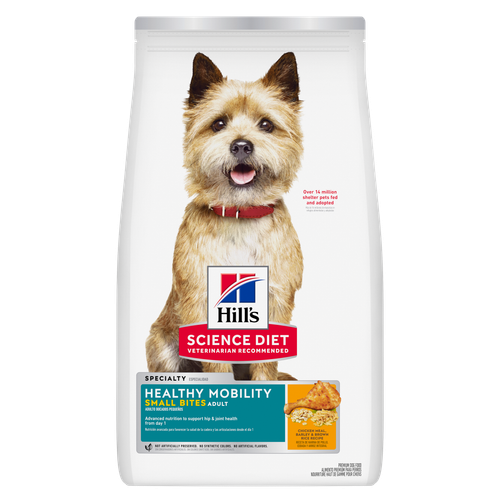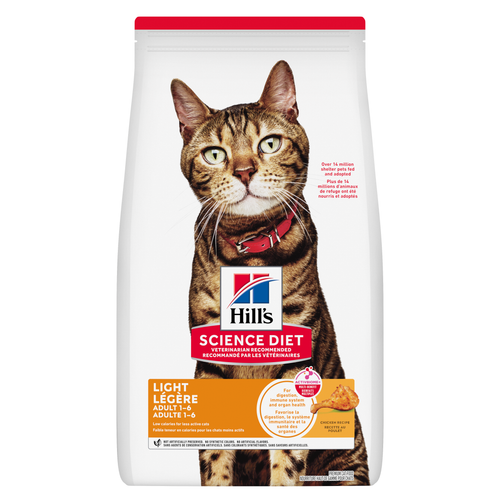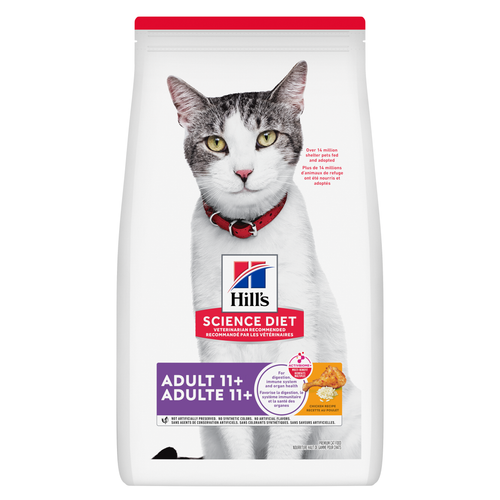
-
Find the right food for your petTake this quiz to see which food may be the best for your furry friend.Find the right food for your petTake this quiz to see which food may be the best for your furry friend.Featured products
 Adult Healthy Mobility Small Bites Chicken Meal, Barley & Brown Rice Recipe Dog Food
Adult Healthy Mobility Small Bites Chicken Meal, Barley & Brown Rice Recipe Dog FoodAdvanced nutrition to support hip & joint health from day 1
Shop Now Adult Sensitive Stomach & Skin Small & Mini Chicken Recipe Dog Food
Adult Sensitive Stomach & Skin Small & Mini Chicken Recipe Dog FoodHill's Science Diet Sensitive Stomach & Skin Small & Mini dry dog food is tailored nutrition for Small & Mini dogs while being gentle on stomachs. Nourishes skin & promotes a lustrous coat.
Shop Now Adult Light Large Breed Chicken Meal & Barley Recipe Dog Food
Adult Light Large Breed Chicken Meal & Barley Recipe Dog Food18% lower calories vs. Science Diet Large Breed Adult
Shop NowFeatured products Adult Healthy Cuisine Seared Tuna & Carrot Medley Cat Food
Adult Healthy Cuisine Seared Tuna & Carrot Medley Cat FoodDelicious seared tuna paired with tender carrots in a mouthwatering sauce
Shop Now Adult Light Chicken Recipe Cat Food
Adult Light Chicken Recipe Cat Food20% lower calories vs. Hill's Science Diet Adult
Shop Now Adult 11+ Chicken Recipe Cat Food
Adult 11+ Chicken Recipe Cat FoodSupports brain health & beautiful fur. Helps keep immune system, heart & kidneys healthy.
Shop Now -
Dog
- Dog Tips & Articles
-
Health Category
- Weight
- Food & Environmental Sensitivities
- Urinary
- Digestive
- Joint
- Kidney
- Dental
- Cancer
-
Life Stage
- Puppy Nutrition
- Adult Nutrition
- Senior Nutrition
Cat- Cat Tips & Articles
-
Health Category
- Weight
- Skin & Food Sensitivities
- Urinary
- Digestive
- Kidney
- Dental
- Stress
- Cancer
-
Life Stage
- Kitten Nutrition
- Adult Nutrition
Featured articles Water
WaterDiscover why water is the most important nutrient for your dog or cat to live a healthy life. Find out how much water your pet should consume each day.
Read More Importance of DHA in your Pet's Food
Importance of DHA in your Pet's FoodLearn about DHA, Docosahexaenoic Acid, a natural omega-3 fatty acid that is essential in the development of the brain and nervous system in cats & dogs.
Read More Antioxidants
AntioxidantsUnderstand the importance of antioxidants in your dog or cat's food, and how they can help protect your pet and keep them healthy.
Read More -


If you have ever seen your cat peeing blood, you know just how alarming it can be. While it isn't something one ever hopes to witness, blood in cat urine is actually quite common. Hematuria, the scientific name for having blood in the urine, can be caused by abnormalities in the urinary tract or even disease processes elsewhere in the body that can affect the urinary tract or kidneys.


Tasty Tips
Healthy pets are happy pets, and no one is a better resource than your pet’s veterinarian.
Blood in Cat Urine: Signs to Look For
While hematuria may be as obvious as blood or blood clots in the urine, it may not always be so visible. Most instances of hematuria are actually diagnosed at the microscopic level on what appears to be normal-colored urine; in these cases, there's only a small amount of blood. Hematuria may cause urine to turn pink or red.
According to the American Veterinary Medical Association, some of the other signs you may see along with a change in the urine's color include:
- Increased drinking
- Increased urination
- Straining to urinate
- Vocalizing when in the litter box
- Going in and out of the litter box repeatedly
- Urinary accidents outside of the litter box
- Inability to urinate altogether (a medical emergency)
- Bruising on the skin in the form of obvious bruises or small dots
- Bleeding from abnormal locations, such as the nose, gums, eyes, ears or rectum, and bloody vomit or feces
Causes of Blood in Urine
If reading these signs has sent you into a panic, take a deep breath. Some of these signs are not typically associated with blood in cat urine and are seen only with rare diseases. Most cases of hematuria in cats are the result of urinary illness and your veterinarian is the best person to help identify what and where exactly that source of illness is.
Your vet will start by taking a medical history of your cat and a physical exam. Some basic labwork for a cat peeing blood may include blood tests, such as a serum biochemistry panel and complete blood count (CBC), as well as an analysis of the urine. Depending on the potential underlying disease, your vet may recommend more specific lab tests, such as a panel to check for abnormalities in blood clotting. If your vet suspects a urinary tract infection, a urine culture test can help identify the specific bacteria that may be present. Abdominal X-rays or an abdominal ultrasound are often recommended to help identify urinary tract stones, tumors or other abnormalities that can cause a cat to pee blood, such as an inflamed bladder.
Most cases of hematuria in cats are due to FIC (feline idiopathic cystitis). Urinary tract infections are actually pretty rare among cats.

Blood in cat urine is actually quite common.
Cat Peeing Blood: Treatment
As with many diseases, treatment for blood in the urine varies depending on the exact cause. For example, kidney or bladder stones may sound like a complete diagnosis, but your vet needs to know what type of stones they're dealing with. Certain stones can be treated noninvasively with a therapeutic food that is capable of dissolving stones entirely. Some stone compositions are resistant to dissolution and will require surgery. Knowing as much as possible about the illness is critical to solving the problem.
Preventing Common Urinary Problems in Cats
You may have heard of a cat parent who struggled with their cat urinating inappropriately or perhaps you're a bit more acquainted with this yourself than you would like. Feline lower urinary tract disease (FLUTD) refers to a spectrum of different diseases that result in inappropriate urination from our feline roommates, explained the Cornell Feline Health Center. No one fully understands why these conditions develop or how to always successfully treat them. Here are two broad categories you can experiment with to prevent your cat from developing feline lower urinary tract signs (LUTS).
- Environment and stimulation: While you may think your house cat lives a cushy life, cats with lower urinary tract signs may disagree. Cats with FLUTD are prone to stress and are a bit higher maintenance than most cats. Giving the cat choices in terms of where to play, rest, eat and urinate can help to minimize stress. For example, each cat should have access to a private rest area, scratching posts and toys. Cats prone to stress often enjoy high perches to keep watch of their surroundings. Ideally provide one litter box for each cat, plus one extra. Cleaning the litter box daily is important for many cats with LUTS (and all cats, for that matter) because they may not want to use a dirty litter box, and therefore may find a cleaner (less optimal) place to do their business.
- Proper nutrition and hydration: The most important ways to help prevent lower urinary tract signs are proper nutrition and adequate water intake. Feeding wet foods is the number one way to improve overall water intake. Circulating water fountains may also be an option to encourage cats to drink more water to increase their water intake. The goal is to keep your cat well-hydrated so the urine is less concentrated and less prone to form crystals, which are the building blocks of stones.
Ensuring your cat eats a well-balanced food that's tailored for its current life stage, rather than one labeled for "all" life stages, is very important. Some foods may have high levels of minerals that may contribute to the development of crystals and stones, which may contribute to lower urinary tract disease.
While cats with LUTS are common, if you ever notice a cat peeing blood, never make assumptions. Always seek veterinary care first to rule out treatable diseases, and remember that the inability to urinate is a life-threatening medical emergency.


Dr. Laci Schaible is a small animal veterinarian, veterinary journalist, and a thought leader in the industry. She received her Doctor of Veterinary Medicine from Texas A&M University and her Masters in Legal Studies from Wake Forest University.
Related Articles


See what Vets have to say
Read reviews from the experts and see why Hill's is the #1 Veterinarian Recommended brand.
See what Vets have to say
Read reviews from the experts and see why Hill's is the #1 Veterinarian Recommended brand.



